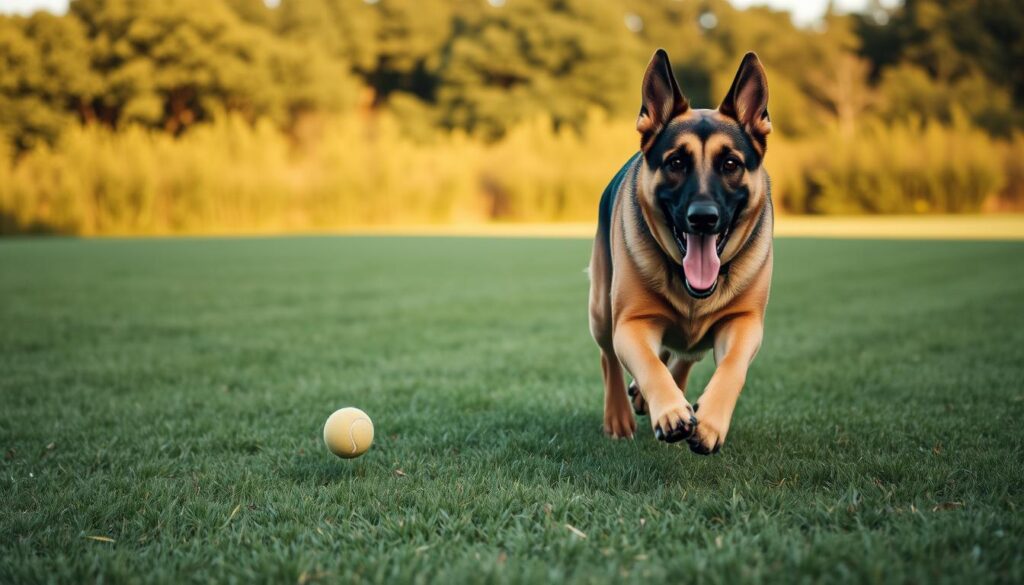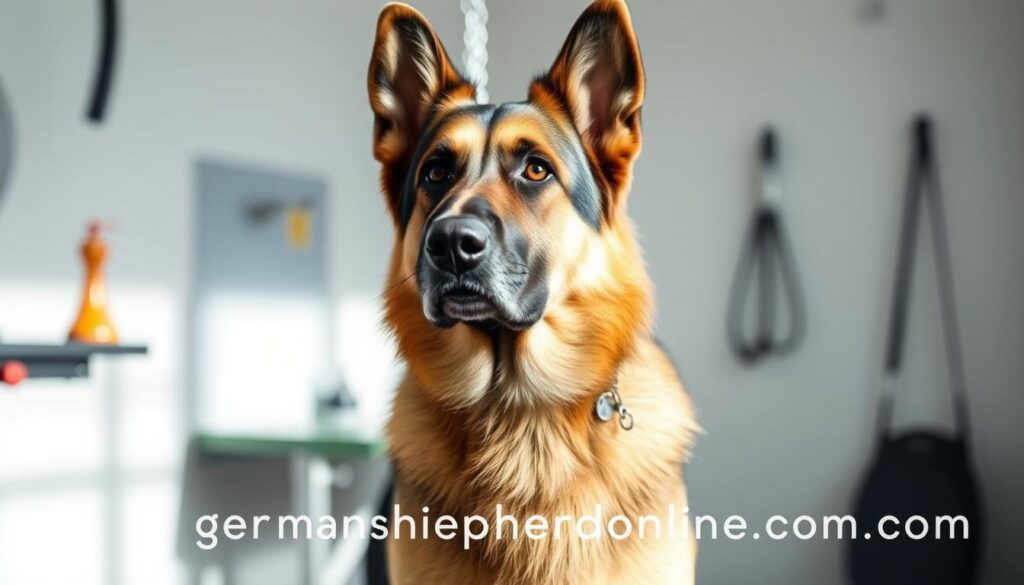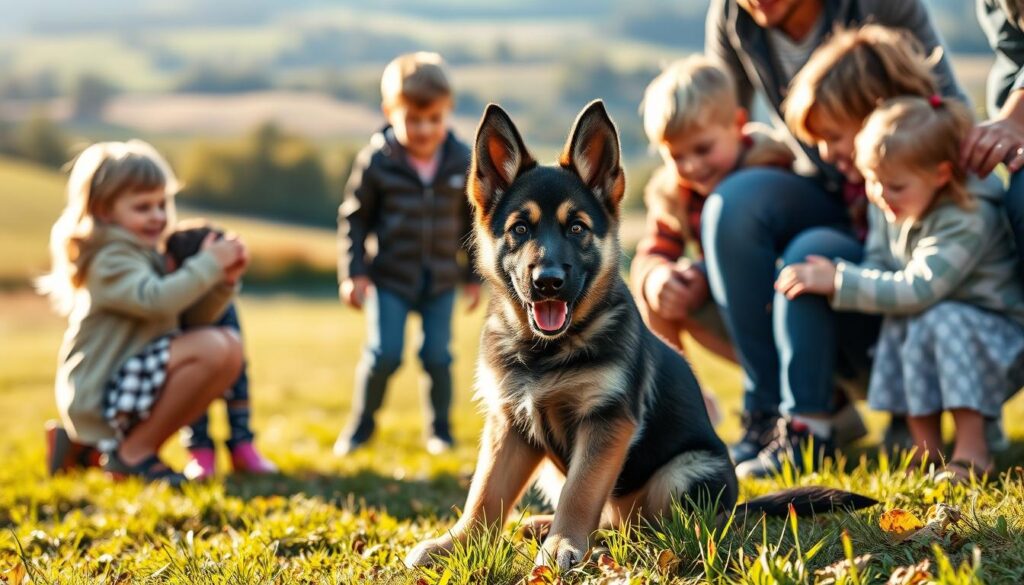As a dog owner, I understand the importance of providing the best care for my dog to keep them healthy and happy. In this article, I will share valuable tips on how to give your dog the best life possible.
From nutrition to exercise, grooming, and training, we’ll cover everything you need to know. Ensuring your dog’s overall well-being requires attention to these key areas.
By following these essential care tips, you can help your dog live a long, happy life. Let’s dive into the details and explore how to provide the best possible care.
Key Takeaways
- Understand the nutritional needs of your dog
- Develop an effective exercise routine
- Implement a regular grooming schedule
- Invest in proper training for your dog
- Monitor your dog’s health and adjust care accordingly
Understanding Your German Shepherd: A Breed Overview
To provide the best care for your GSD, it’s crucial to understand the breed’s characteristics. Known for their intelligence, loyalty, and protective nature, German Shepherds make great companions. However, they can be prone to certain health issues.
The German Shepherd Temperament and Personality
German Shepherds are highly intelligent dogs that are often used in various roles such as search and rescue, guiding the blind, and as police dogs. Their temperament is characterized by loyalty, courage, and a strong protective instinct. As stated by a renowned dog trainer, “German Shepherds are one of the most versatile breeds, exceling in obedience, agility, and loyalty.”
German Shepherds are highly intelligent and responsive to training, making them a popular choice for many roles.
Their personality can vary from friendly and outgoing to more reserved, depending on socialization and training.
Early socialization and consistent training are key to developing a well-balanced German Shepherd.
Common Health Concerns for German Shepherds
Like many breeds, German Shepherds are prone to certain health issues. Hip dysplasia is a common concern, a genetic condition that can lead to arthritis and mobility issues. Digestive problems are also not uncommon in this breed. Regular veterinary check-ups and a balanced diet can help mitigate these risks. As a responsible owner, being aware of these potential health concerns is crucial for providing the best care.
Monitoring your German Shepherd’s health and addressing any issues promptly is vital for ensuring a long, healthy life.
Tip 1: Essential German Shepherd Care Through Proper Nutrition
Providing your German Shepherd with a well-balanced diet is crucial for their overall health and happiness. A well-nourished German Shepherd is more likely to be energetic, obedient, and overall healthy.
Balanced Diet Requirements for German Shepherds
A balanced diet for German Shepherds should be rich in protein, moderate in fat, and low in carbohydrates. This balance is essential to maintain their energy levels and support their overall health.
Protein and Fat Needs
German Shepherds require a diet with high-quality protein sources, such as chicken, beef, or fish, to support their muscle growth and maintenance. The protein content should be around 25% to 30% on a dry matter basis. Additionally, they need a moderate amount of fat, around 15% to 20%, to provide energy and support skin and coat health.
Vitamins and Minerals
Vitamins and minerals are crucial for various bodily functions, including immune function, bone health, and energy metabolism. German Shepherds require a balanced mix of vitamins A, D, E, and K, as well as minerals like calcium, phosphorus, and potassium.
Best Food Options for German Shepherds
When choosing the best food for your German Shepherd, consider high-quality commercial dog foods that meet their nutritional needs. Look for foods that are rich in protein, moderate in fat, and low in carbohydrates. You can also consider raw or homemade diets, but it’s essential to consult with a veterinarian to ensure the diet is balanced.

| Nutrient | Recommended Amount | Food Sources |
|---|---|---|
| Protein | 25%-30% | Chicken, beef, fish |
| Fat | 15%-20% | Fish oil, chicken fat |
| Carbohydrates | Low | Sweet potatoes, green beans |
| Vitamins | Balanced mix | Meat, dairy, and vegetables |
| Minerals | Balanced mix | Meat, dairy, vegetables |
Feeding Schedule and Portion Control
To maintain your German Shepherd’s optimal weight and overall health, it’s essential to follow a consistent feeding schedule and practice portion control. Divide their daily ration into 2-3 meals until they are about six months old, then switch to twice a day. The portion size will depend on their age, size, and activity level, so be sure to consult with your veterinarian to determine the ideal feeding schedule for your dog.
Tip 2: Exercise Needs and Physical Activity
German Shepherds are an energetic breed that requires a well-structured exercise routine to stay happy and healthy. Regular physical activity not only maintains their physical health but also plays a crucial role in their mental well-being.

Daily Exercise Requirements for German Shepherds
German Shepherds need at least 1-2 hours of exercise daily, which can be a combination of walks, runs, and playtime. This breed thrives on activity, and a lack of exercise can lead to behavioral issues and health problems. A consistent exercise routine is key to a happy, healthy German Shepherd.
Best Exercise Activities for German Shepherds
The best exercises for German Shepherds are those that challenge them physically and mentally. Activities such as agility training, obedience exercises, and hiking are excellent options.
High-Energy Activities
For younger, more energetic German Shepherds, high-energy activities like running and agility training are ideal. These activities not only burn energy but also provide mental stimulation.
Low-Impact Exercises for Older Dogs
As German Shepherds age, lower-impact exercises such as short walks and gentle play can help maintain their mobility without straining their joints. It’s essential to adjust the exercise routine according to the dog’s age and health condition.
Mental Stimulation Through Exercise
Exercise is not just about physical health; it also provides mental stimulation. Activities that challenge the mind, such as obedience training and puzzle toys, are crucial for preventing boredom and stress. As one expert notes, “A tired dog is a happy dog,” highlighting the importance of a well-rounded exercise routine.
“Exercise is a key component of a German Shepherd’s daily routine, contributing to their overall happiness and health.”
By incorporating a mix of physical activity and mental stimulation, you can ensure your German Shepherd leads a fulfilling life.
Tip 3: Grooming Your German Shepherd
German Shepherd grooming is not just about appearance; it’s a vital part of their overall care. Regular grooming sessions help prevent matting, reduce shedding, and detect potential health issues early.
Brushing and Coat Maintenance
Brushing your German Shepherd regularly is crucial for their coat health. It helps distribute skin oils, preventing dryness and irritation. For German Shepherds, a weekly brushing session is recommended, using a brush that can handle their double coat. This practice not only reduces shedding but also strengthens the bond between you and your dog.

Bathing and Nail Care
Bathing should be done as needed, typically every 2-3 months, or when your dog gets dirty. Use a dog-specific shampoo to maintain the natural oils in their coat. Nail care is also vital; trim your German Shepherd’s nails every 4-6 weeks to prevent overgrowth, which can cause discomfort and health issues.
Dental Hygiene for German Shepherds
Dental care is a critical aspect of grooming. Brush your German Shepherd’s teeth regularly with dog-specific toothpaste to prevent tartar buildup and promote overall health. Regular dental checks can help identify issues early, ensuring your dog’s mouth remains healthy.
| Grooming Activity | Frequency | Benefits |
|---|---|---|
| Brushing | Weekly | Reduces shedding, prevents matting, distributes skin oils |
| Bathing | Every 2-3 months | Maintains cleanliness, reduces odor |
| Nail Trimming | Every 4-6 weeks | Prevents overgrowth, reduces discomfort |
| Dental Care | Regularly | Prevents tartar buildup, promotes overall health |
By incorporating these grooming practices into your routine, you can significantly improve your German Shepherd’s quality of life. Regular grooming not only keeps them looking their best but also plays a crucial role in their overall health and happiness.
Tip4: Training and Mental Stimulation
As one of the most intelligent breeds, German Shepherds benefit significantly from structured training programs and engaging mental activities. Training is not just about teaching commands; it’s about providing mental stimulation and managing their high energy levels.
Basic Obedience Training Techniques
Basic obedience training is foundational for any German Shepherd. It includes teaching commands like “sit,” “stay,” “come,” and “leave it.” Consistency and positive reinforcement are key. Using treats and praise, you can encourage good behavior and discourage bad habits. For instance, during training sessions, using positive reinforcement techniques such as clicker training can be highly effective.

Advanced Training for German Shepherds
Once your German Shepherd has mastered basic obedience, you can move on to advanced training techniques. These can include agility training, protection training, and complex command sequences. Advanced training not only challenges your dog physically but also mentally, reducing the likelihood of boredom and destructive behavior.
Mental Enrichment Activities
Mental enrichment is crucial for German Shepherds, keeping their minds active and engaged. Activities can include:
- Puzzle toys filled with treats
- Scent work and tracking exercises
- Interactive games like hide-and-seek
Puzzle Toys and Games
Puzzle toys are an excellent way to challenge your German Shepherd mentally. By filling these toys with treats, you encourage problem-solving and reward persistence.
Scent Work and Tracking
Scent work and tracking tap into a German Shepherd’s natural herding instincts. These activities provide both mental stimulation and physical exercise, making them highly rewarding.
| Training Activity | Mental Stimulation Level | Physical Exercise Level |
|---|---|---|
| Basic Obedience | Medium | Low |
| Agility Training | High | High |
| Scent Work | High | Medium |
By incorporating a mix of these training and mental stimulation activities, you can ensure your German Shepherd remains happy, healthy, and well-behaved.
Tip5: Socialization and Behavior Management
Socialization is a critical aspect of German Shepherd care that significantly impacts their behavior and overall well-being. As a responsible dog owner, it’s essential to understand the importance of socialization and how to manage your dog’s behavior effectively.
Early Socialization Importance
Early socialization is crucial for German Shepherds, as it exposes them to various environments, people, and other animals, helping to reduce anxiety and prevent behavioral issues. During the first 16 weeks, puppies are most receptive to new experiences, making it a critical period for socialization. I recommend introducing your puppy to different situations, such as walks in the park, visits to pet stores, and interactions with other dogs and people, to help them become confident and calm.
Key areas to focus on during early socialization include:
- Exposing your puppy to various sounds and noises
- Introducing your puppy to different textures and surfaces
- Socializing your puppy with people of different ages and backgrounds

Managing Common Behavioral Issues
Despite proper socialization, German Shepherds can sometimes develop behavioral issues such as barking, chewing, or digging. To manage these issues, it’s essential to identify the underlying cause and address it accordingly. For example, if your dog is barking due to boredom, providing adequate exercise and mental stimulation can help alleviate the problem.
| Behavioral Issue | Possible Cause | Solution |
|---|---|---|
| Barking | Boredom or anxiety | Provide exercise and mental stimulation |
| Chewing | Teething or lack of stimulation | Offer appropriate chew toys and engage in play |
| Digging | Instinct or boredom | Provide adequate exercise and create a designated digging area |
Socialization Throughout Your German Shepherd’s Life
Socialization is not limited to the puppy stage; it’s a continuous process that should be maintained throughout your German Shepherd’s life. Regularly exposing your dog to new experiences, such as new environments, people, and other animals, will help keep them well-adjusted and calm. I recommend incorporating socialization into your daily routine, such as during walks or playtime, to ensure your dog remains socially adept.
By prioritizing socialization and behavior management, you can help your German Shepherd become a well-behaved and loving companion.
Tip 6: Regular Veterinary Care and Health Monitoring
Maintaining your German Shepherd’s health requires a commitment to regular veterinary care and monitoring. This involves a combination of regular check-ups, preventative care, and being vigilant about potential health issues.
Vaccination and Preventive Care Schedule
A well-planned vaccination and preventative care schedule is crucial for protecting your German Shepherd from diseases and parasites. This includes vaccinations against rabies, distemper, and parvovirus, as well as preventative measures against fleas, ticks, and heartworms. Consult with your veterinarian to determine the best schedule for your dog based on their age, health, and lifestyle.
Key Vaccinations and Preventatives:
- Rabies vaccination
- Distemper, hepatitis, parvovirus (DHPP) vaccination
- Flea and tick prevention
- Heartworm prevention
Recognizing Signs of Health Problems
German Shepherds can be prone to certain health issues, such as hip dysplasia and digestive problems. Being able to recognize the signs of these issues early on can make a significant difference in treatment outcomes. Common signs to watch for include limping, changes in appetite or stool quality, and unusual behavior.

Managing Age-Related Health Issues
As your German Shepherd ages, they may be more likely to experience certain health issues, such as arthritis or cognitive decline. Regular veterinary check-ups can help identify these issues early, and your veterinarian can recommend appropriate management strategies, including medication, lifestyle changes, and alternative therapies.
Regular health monitoring and veterinary care are key to ensuring your German Shepherd lives a long, healthy life.
Tip 7: Creating a Safe and Comfortable Living Environment
To ensure your German Shepherd leads a happy and healthy life, their living environment must be safe and comfortable. This involves creating a space that caters to their physical and emotional needs, both indoors and outdoors.
A well-designed living environment not only enhances your dog’s quality of life but also strengthens the bond between you and your pet. It’s about understanding their requirements and making adjustments to your home accordingly.
Indoor Living Space Requirements
German Shepherds need a comfortable indoor space where they can rest, eat, and relax. Ensure your home is dog-proofed by removing hazardous items and securing toxic substances out of reach. Provide a comfortable bed or crate where your dog can retreat when needed.
The indoor area should be well-ventilated and maintained at a comfortable temperature. Adequate lighting is also crucial, as it affects your dog’s mood and overall well-being.

Outdoor Space and Exercise Areas
Outdoor space is vital for German Shepherds, who require regular exercise to stay healthy. If you have a yard, ensure it’s securely fenced to prevent escape or injury. The yard should provide enough space for your dog to run around and play.
For those without a yard, alternative exercise areas such as parks or dog parks can be used. Regular walks and playtime are essential to keep your German Shepherd physically and mentally stimulated.
Temperature Considerations for German Shepherds
German Shepherds can adapt to various temperatures, but extreme conditions can be harmful. In hot weather, ensure your dog has access to shade and plenty of water to prevent dehydration. In cold weather, provide a warm shelter or consider using a dog coat for added warmth.
Monitoring the temperature and adjusting your dog’s living environment accordingly is crucial for their comfort and safety.
| Temperature Range | Precautions |
|---|---|
| Above 80°F (27°C) | Provide shade, plenty of water, and limit exercise to cooler parts of the day. |
| Below 40°F (4°C) | Provide a warm shelter, consider a dog coat, and limit exposure to cold. |
Tip 8: Building a Strong Bond With Your German Shepherd
To ensure a happy and healthy relationship, building a strong bond with your German Shepherd is essential. This bond is fostered through a combination of quality time, understanding your dog’s needs, and engaging in activities that promote mutual understanding.
Quality Time and Interaction
Spending quality time with your German Shepherd is vital for developing a strong bond. This can be achieved through simple activities like going for walks, playing fetch, or just cuddling on the couch. Consistency is key; regular interaction helps your dog feel secure and strengthens your relationship.
It’s also important to engage in activities that stimulate your dog’s mind, such as obedience training or puzzle toys. These activities not only challenge your dog but also provide an opportunity for you to bond over shared experiences.
Understanding Your German Shepherd’s Body Language
Understanding your German Shepherd’s body language is crucial for building a strong bond. Dogs communicate primarily through body language, and being able to read these signals can help you respond to their needs more effectively.
For example, a wagging tail can indicate excitement or happiness, while a tucked tail may suggest fear or anxiety. By paying attention to these cues, you can adjust your interactions to better support your dog’s emotional state.
Activities That Strengthen Your Bond
Engaging in activities that promote interaction and understanding is vital for strengthening your bond with your German Shepherd. Some effective activities include:
- Training sessions
- Playtime activities like fetch or agility training
- Grooming sessions, which can be a calming and bonding experience
| Activity | Benefits | Frequency |
|---|---|---|
| Training Sessions | Mental stimulation, obedience | Daily |
| Playtime | Physical exercise, bonding | Several times a week |
| Grooming | Relaxation, bonding | Weekly |
Conclusion: A Lifetime of Love and Care for Your German Shepherd
Caring for a German Shepherd requires a comprehensive approach that encompasses proper nutrition, regular exercise, grooming, training, and socialization. By following the 8 best care tips outlined in this article, you can help ensure a healthy and happy life for your dog.
Every German Shepherd is unique, and tailoring your care to your dog’s individual needs is crucial. Providing a safe and comfortable living environment, regular veterinary care, and building a strong bond with your dog are essential components of German Shepherd care.
By prioritizing your dog’s physical and emotional well-being, you can foster a happy German Shepherd that thrives under your care. A healthy German Shepherd is a joy to be around, and with the right care, you can enjoy a lifelong companionship with your dog.
FAQ
What are the most common health issues in German Shepherds?
German Shepherds are prone to certain health issues, such as hip dysplasia, digestive problems, and allergies. Regular veterinary care and monitoring can help identify these issues early on.
How often should I feed my German Shepherd?
The frequency of feeding depends on factors such as age, size, and activity level. Generally, German Shepherds require two meals a day, but it’s essential to consult with your veterinarian to determine the best feeding schedule for your dog.
What is the best exercise routine for German Shepherds?
German Shepherds require regular exercise to stay happy and healthy. A combination of high-energy activities, such as running and agility training, and low-impact exercises, such as walking and obedience training, can provide a well-rounded exercise routine.
How often should I groom my German Shepherd?
German Shepherds require regular grooming to prevent matting and shedding. Brushing your dog at least twice a week, with daily brushing recommended during shedding season, can help keep their coat healthy.
What are some tips for training a German Shepherd?
Training is essential for German Shepherds, and it starts with basic obedience training. Consistency, positive reinforcement, and patience are key to successful training. Advanced training methods, such as agility and protection training, can also be beneficial.
How can I socialize my German Shepherd?
Socialization is critical for German Shepherds, and it starts from an early age. Exposing your dog to various environments, people, and other animals can help reduce anxiety and behavioral issues.
What are some signs of health problems in German Shepherds?
Signs of health problems in German Shepherds can include changes in appetite, vomiting, diarrhea, lethargy, and difficulty walking. If you notice any of these symptoms, it’s essential to consult with your veterinarian promptly.
How can I create a safe and comfortable living environment for my German Shepherd?
Creating a safe and comfortable living environment involves providing adequate indoor and outdoor space, ensuring temperature comfort, and removing hazards. Providing a comfortable place to rest and relax is also essential.
What are some activities that can strengthen my bond with my German Shepherd?
Activities such as training, play, and simply spending quality time together can strengthen your bond with your German Shepherd. Understanding your dog’s body language and responding to their needs can also help build a strong relationship.
How can I keep my German Shepherd happy and healthy as they age?
As German Shepherds age, their needs change. Adjusting their exercise routine, diet, and living environment to accommodate their age-related needs can help keep them happy and healthy. Regular veterinary care is also essential for maintaining their health.
